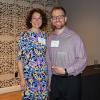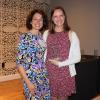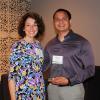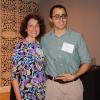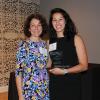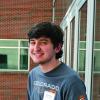news
BME Graduate Award Winners 2017-2018
Primary tabs
Six graduate students were honored at this year’s fourth annual BME Graduate Awards event hosted by the Wallace H. Coulter Department of Biomedical Engineering at Georgia Tech and Emory. Susan Margulies, chair of the Coulter Department, hosted the event and presented awards to all of the honorees.
The Outstanding Fundamental/Basic Research Award went to Eric Snider. This award honors a graduate student who has performed exceptional fundamental research, leading to high impact publications in non-translational-focused journals and presentations at national/international conferences. Snider’s thesis research is focused on developing stem cell therapies for glaucoma patients.
“Eric is one of the hardest-working graduate students I have advised. However, his abilities go beyond simply hard work: he is also an excellent “big picture” strategist. Specifically, he is always thinking about the overall project scope, next steps, and potential problems so that each project aspect moves forward quickly and efficiently,” said Ross Ethier, the Lawrence L. Gellerstedt, Jr., Chair in Bioengineering, Georgia Research Alliance Eminent Scholar in Biomechanics and Mechanobiology, and professor of biomedical engineering.
The Outstanding Teaching/Mentorship Award went to Travis Meyer. This award honors a graduate student who has demonstrated excellence in teaching or mentorship in the classroom, the lab, or elsewhere in the community. A week earlier, Meyer was named Graduate Teaching Assistant of the Year (2018) by Georgia Tech's Center for Teaching and Learning.
“Travis Meyer is passionate about teaching as demonstrated by being a teaching assistant for five semesters, three more than the requirement in BME. In addition, he has been an enthusiastic fellow in the Preparing Future Faculty program,” said Machelle Pardue, professor of biomedical engineering.
The Outstanding Community Service Award went to Katie Young. This award honors a graduate student who has provided significant education, outreach, or community service to the larger community.
Katie served as a summer science camp instructor and developer for BioIgnite, an area nonprofit organization, where she taught weekly summer camp modules on topics ranging from biomedical imaging to cancer biology. Katie also serves as a Young Life volunteer, serving as a mentor and team lead for middle school students, and she is an active participant in BBUGS, performing science demonstrations for students ranging from elementary to high school.
Katy Lassahn, executive director of BioIgnite, says “Katie Young stands out as one of our best teachers and volunteers. She was the best person to start teaching “early in the morning” because her high energy woke the students up and got them excited about the topic of the day. I cannot tell you how difficult this can sometimes be with middle schoolers and is a testament to her drive to make an impact on the students she teaches.”
The Outstanding Translational Research Award went to Andreś Caballero. This award honors a graduate student who has demonstrated excellence in translational research (e.g., publications in translation-focused journals, patents, clinical testing, achieving FDA clearance).
Andreś research involves using computational models to better understand blood flow through the heart. Specifically, he studies the interaction between blood flow through the heart and its impact on the mitral valve and heart wall. Caballero collaborates with surgeons, cardiologists, echocardiography professionals, computer scientists, applied mathematicians, and engineers. He was the recipient of a Fulbright Scholarship and currently has nine co-authored, peer-reviewed publications, five of which are first author publications.
Raymond McKay, director of interventional cardiology research and cardiovascular data management, states, “I am particularly excited about the significance and translational impact of Andreś biomechanical computational research. From a clinical perspective, such computational capability is an invaluable tool to better understand each patient’s unique cardiac anatomy and blood flow…thus eventually speeding the process of personalizing the treatment decisions.”
The Outstanding Entrepreneurship Award went to Robert Mannino. This award honors a graduate student who has demonstrated an entrepreneurial spirit, turning their innovative ideas into reality, demonstrated through definable metrics (e.g., winning business plan competitions, securing funding for start-up activities, starting a company based on their research).
Mannino’s research is centered around the development of a smartphone app that can quickly and easily diagnose anemia by simply taking an image of a patient’s fingernail beds. He has garnered a national reputation, most recently receiving a $100,000 prize from Massachusetts General Hospital in which he won first place in their national 2017 Student Technology Prize for Primary Healthcare. As a member of the TI:GER program (Technological Innovation: Generating Economic Results), Rob and his TI:GER team recently won Cisco’s $100,000 Global Problem Solver Prize at the Rice Business Plan Competition.
“I was impressed by his motivation, intelligence, and maturity and welcomed him to join my bioengineering hematology laboratory at Georgia Tech and Emory University,” said Wilbur Lam, associate professor of biomedical engineering and Mannino’s advisor. “It turns out that that was one of the best decisions I have made for our lab. I can say without a doubt that during his career, he will develop novel medical technologies that will change the lives of hematology patients across the world and for generations to come.”
The Outstanding Departmental Service Award went to Aline Nachlas. This award honors a graduate student who has demonstrated leadership or has provided academic support within the Department.
Nachlas serves as one of two student representatives on our BME graduate program committee, where she provides a student voice to stakeholders, and she lobbies for continual improvement to our program structure and function. She was instrumental in recent changes to qualifying exams and student stipends. Nachlas has served as a student representative on the BME Department Diversity and Inclusion Committee, where she was involved in a community-wide climate study and contributed to the formation of a diversity and inclusion statement, and she recently founded the Alliance for Diversity in Science and Engineering (ADSE) Chapter.
Kyle Cowdrick, M.S.E., Ph.D. student in biomedical engineering, says “Aline is a woman of action who delivers results that benefit our graduate community. Her passion for promoting a positive culture of change is exemplified by her dedication in listening to the concerns of our graduate student body, and translating those concerns into actionable steps that make BME a more inclusive and supportive environment.”
CONTACT:
Walter Rich
Wallace H. Coulter Department of Biomedical Engineering
Georgia Institute of Technology
Status
- Workflow status: Published
- Created by: Walter Rich
- Created: 04/27/2018
- Modified By: Walter Rich
- Modified: 04/27/2018
Keywords


